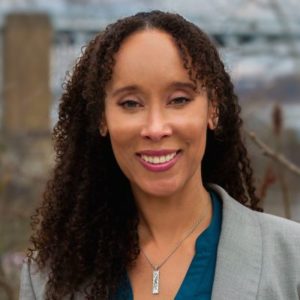 As a FUSE Executive Fellow, Mica L. Williams (2019-20) worked with the Pittsburgh Bureau of Police to evaluate a pilot community-based policing unit. As part of this work, Mica developed strategic recommendations for improving and replicating the model throughout the city. After her fellowship, she joined Foundation of HOPE, an inter-faith organization offering support services to youths and adults impacted by the criminal justice system. As the organization’s Director of Adult Diversion, Mica is working directly with the City of Pittsburgh, Pittsburgh Police, the Allegheny County District Attorney, and the community to help establish Pittsburgh’s first Adult Diversion Program.
As a FUSE Executive Fellow, Mica L. Williams (2019-20) worked with the Pittsburgh Bureau of Police to evaluate a pilot community-based policing unit. As part of this work, Mica developed strategic recommendations for improving and replicating the model throughout the city. After her fellowship, she joined Foundation of HOPE, an inter-faith organization offering support services to youths and adults impacted by the criminal justice system. As the organization’s Director of Adult Diversion, Mica is working directly with the City of Pittsburgh, Pittsburgh Police, the Allegheny County District Attorney, and the community to help establish Pittsburgh’s first Adult Diversion Program.
How did the FUSE Fellowship impact you?
Throughout my academic career, I was captivated by critical social theories and the histories of carceral systems, policing, and criminal justice. I wanted to help change the justice system, but didn’t know where to apply what I had learned. The FUSE fellowship was the first role that allowed me to be at the center of community and policing, to listen to various first-person perspectives, and actually make recommendations that could help drive positive change. Producing a 50-page report with tangible proposals for the police department was a challenge I enjoyed. I had to stay confident in myself and that I had the chops to do the job. At the end, veteran leaders were impressed with my research and open to my ideas.
My fellowship also broadened my perspectives on policing. I grew up with police in my extended family, but as a person of color, I was aware of how abusive police practices had perpetuated minority oppression. After working closely with police, I have seen the responsibility, stress, and danger that come with the job. I also experienced the loss of an officer I’d become close to. The way his death affected not just the police, but also the community, showed me that this community policing unit had started building the bridges between police and public it was meant to. My FUSE year was a growth experience and wonderful opportunity. It gave my training and perspectives more nuance and depth. I’m still very close to most of the officers and community members I worked with.
FUSE was also my introduction to Pittsburgh, where I still work. My fellowship allowed me to learn the landscape of agencies, the individuals in leadership, and how community members can come together to influence decisions.
What are you working on now?
I now work at a nonprofit called Foundation of HOPE. The Adult Diversion model we are building is meant to intercede at the point of police contact so that, instead of being charged, people accused of certain misdemeanors are referred to our program. Police haven’t been able to participate yet because of a state law prohibiting them from sharing information during an investigation, and so the program launch was delayed. In the interim, however, my staff and I have implemented a proactive community-referral model, aimed at reaching those individuals at high risk of being charged or jailed.
Our first participant reached out to us himself, to avoid using substances and ending up in jail at the holidays. We used a harm reduction approach, where the client tells us their needs, to help this participant stay safe and stable. We now have 10 participants. My second quarterly report to the City describes how most participants need similar things, like housing, IDs, clothing, substance and behavioral counseling, medical attention, and food access. We connect them to services through our city-wide network of evidence-based providers.
What are the big challenges on which you are working now, and how has your FUSE experience prepared you to approach them?
We work with many stakeholders who may have divergent interests and beliefs about how this work should be done. In some cases, you might be the only person in the room taking a certain position. But my FUSE experience taught me that, if you believe in what you are saying, you have to be confident and stick to your guns. In my fellowship and with Foundation of HOPE, I have had to navigate some challenging professional situations. Afterward, police and community partners have thanked me for holding steady through some pretty ugly moments.
What are you hoping to achieve in the next 6-12 months?
I am excited to accept referrals from the police when that becomes possible. I also want to help expand diversion beyond the North Side to other parts of the city. Having already drafted Standard Operating Procedures and conducted state research on privacy and record-keeping standards, I’m hoping to support other organizations looking to do this work.
Additionally, one of my biggest aspirations is to address housing, which is a monolith of need. Pittsburgh has so many empty houses, and yet we don’t have enough resources for unhoused individuals. Landlords often don’t want to rent to people with criminal records. Many formerly incarcerated and unhoused folks don’t have work histories and aren’t eligible for Social Security. Stable housing is the biggest indicator of success for diversion; if you don’t have a place to live, you are less likely to thrive.
Related works and news:
Mica Williams: FUSE Fellowship Report: Northview Heights Community Safety Partnership: Relationship-Based Policing Research and Recommendations
